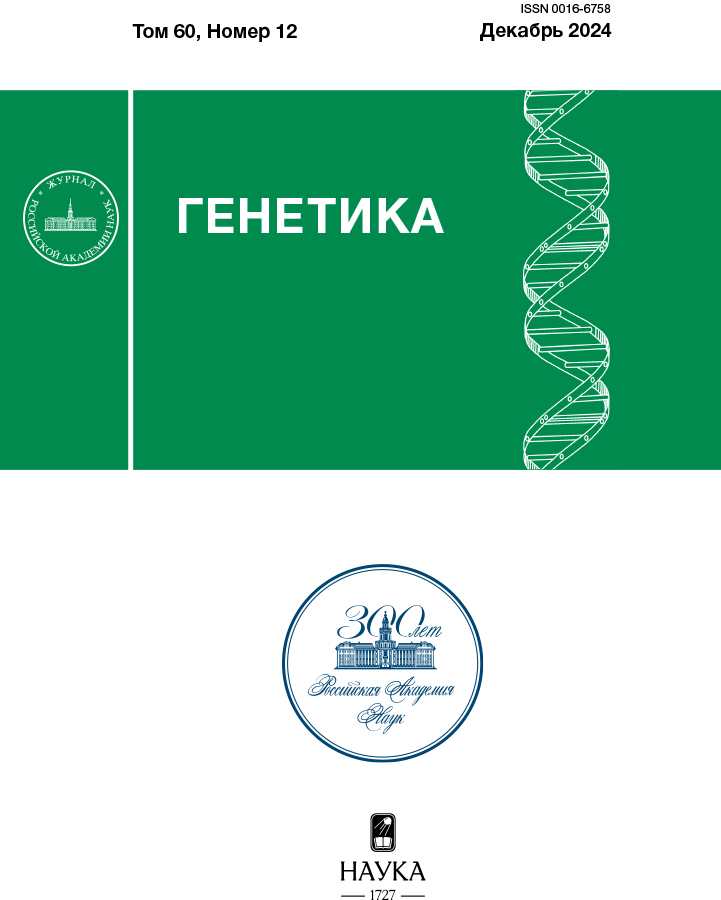Effect of Genotype at ADH1B Alcoholdehydrogenase Gene on Level of cdt Alcohol Abuse Marker
- Authors: Kim A.A.1, Gureev A.S.1, Rubanovich A.V.1, Borinskaya S.A.1
-
Affiliations:
- Vavilov Institute of General Genetics, Russian Academy of Sciences
- Issue: Vol 60, No 12 (2024)
- Pages: 115–120
- Section: КРАТКИЕ СООБЩЕНИЯ
- URL: https://rjpbr.com/0016-6758/article/view/676601
- DOI: https://doi.org/10.31857/S0016675824120125
- EDN: https://elibrary.ru/vzridw
- ID: 676601
Cite item
Abstract
Alcohol abuse poses an important challenge to public health and is associated with a shorter lifespan, numerous disorders, and social and economic problems. Methods to identify heavy drinkers are necessary for choosing the prevention and treatment strategies in medicine and are in demand in forensics. Alcohol consumption is often underestimated in self-reported data, and objective laboratory tests are therefore essential to employ in diagnosing chronic alcohol abuse and acute alcoholic excess. Carbohydrate-deficient transferrin (CDT) is one of the most specific biomarkers of alcohol abuse. CDT is a set of transferrin isoforms with a lower content of sialic acid residues and is found when glycosylation is impaired by ethanol metabolites. Oxidation of exogenous ethanol to acetaldehyde by alcohol dehydrogenase 1B (ADH1B) is a major pathway of ethanol metabolism. This study showed for the first time that carriers of the allele ADH1B*48His (rs1229984), which determines acetaldehyde production to higher concentrations, have greater CDT levels as compared with noncarriers, alcohol consumption being the same. The difference should be taken into account in medicine, forensics, and studies where Mendelian randomization with respect to the polymorphic locus rs1229984 is performed to address the effects of drinking alcohol.
Full Text
About the authors
A. A. Kim
Vavilov Institute of General Genetics, Russian Academy of Sciences
Email: rubanovich@vigg.ru
Russian Federation, Moscow, 119991
A. S. Gureev
Vavilov Institute of General Genetics, Russian Academy of Sciences
Email: rubanovich@vigg.ru
Russian Federation, Moscow, 119991
A. V. Rubanovich
Vavilov Institute of General Genetics, Russian Academy of Sciences
Author for correspondence.
Email: rubanovich@vigg.ru
Russian Federation, Moscow, 119991
S. A. Borinskaya
Vavilov Institute of General Genetics, Russian Academy of Sciences
Email: borinskaya@vigg.ru
Russian Federation, Moscow, 119991
References
- Андреев Е.М., Кирьянов Н.А., Леон Д. и др. Злоупотребление алкоголем и преждевременная смертность в России на примере Ижевска // Наркология. 2008. № 7. С. 38–52.
- Leon D.A., Saburova L., Tomkins S. et al. Hazardous alcohol drinking and premature mortality in Russia: A population based case-control study // Lancet. 2007. V. 369. № 9578. P. 2001–2009. https://doi.org/10.1016/S0140-6736(07)60941-6
- Midanik L.T. Validity of self-reported alcohol use: А literature review and assessment // Br. J. Addict. 1988. V. 83. № 9. P. 1019–1030. https://doi.org/10.1111/j.1360-0443.1988.tb00526.x
- Немцов А.В., Андриенко Ю.В. Самоотчеты населения России о потреблении алкоголя // Наркология. 2007. № 5. C. 58–61.
- Jones A.W. Brief history of the alcohol biomarkers CDT, EtG, EtS, 5-HTOL, and Peth // Drug Test Anal. 2024. V. 16. № 6. P. 570–587. https://doi.org/10.1002/dta.3584
- Брюн Е.А., Мягкова М.А., Сокольчик Е.И. и др. Методика диагностического тестирования на предмет хронического злоупотребления алкоголем. Методические рекомендации. № 16. М.: 2011. 40 с.
- Stibler H., Kjellin K.G. Isoelectric focusing and electrophoresis of the CSF proteins in tremor of different origins // J. Neurol. Sci. 1976. V. 30. P. 269–285. https://doi.org/10.1016/0022-510x(76)90133-7
- Bergström J.P., Helander A. Influence of alcohol use, ethnicity, age, gender, BMI, and smoking on the serum transferrin glycoform pattern: Implications for use of carbohydrate-deficient transferrin (CDT) as alcohol biomarker // Clin. Chim. Acta. 2008. V. 388. № 1–2. P. 59–67. https://doi.org/10.1016/j.cca.2007.10.011
- Stibler H. Carbohydrate-deficient transferrin in serum: A new marker of potentially harmful alcohol consumption reviewed // Clin. Chem. 1991. V. 37. № 12. P. 2029–2037.
- Helander A., Wielders J., Anton R. et al. International Federation of Clinical Chemistry and Laboratory Medicine Working Group on Standardisation of Carbohydrate-Deficient Transferrin (IFCC WG-CDT). Reprint of standardisation and use of the alcohol biomarker carbohydrate-deficient transferrin (CDT) // Clin. Chim. Acta. 2017. V. 467. P. 15–20. https://doi.org/10.1016/j.cca.2017.03.018
- Lakshman M.R., Rao M.N., Marmillot P. Alcohol and molecular regulation of protein glycosylation and function // Alcohol. 1999. V. 19. № 3. P. 239–247. https://doi.org/10.1016/s0741-8329(99)00041-5
- Flahaut C., Michalski J.C., Danel T. et al. The effects of ethanol on the glycosylation of human transferrin // Glycobiology. 2003. V. 13. № 3. P. 191–198. https://doi.org/10.1093/glycob/cwg016
- Bortolotti F., Sorio D., Bertaso A., Tagliaro F. Analytical and diagnostic aspects of carbohydrate deficient transferrin (CDT): А critical review over years 2007–2017 // J. Рharmaceutical and Biomed. Аn. 2018. V. 147. P. 2–12. https://doi.org/10.1016/j.jpba.2017.09.006
- Borinskaya S., Kal'ina N., Marusin A. et al. Distribution of alcohol dehydrogenase ADH1B*47His allele in Eurasia // Am. J. Hum. Genet. 2009. V. 84. № 1. P. 89–92. https://doi.org/10.1016/j.ajhg.2008.12.007
- McDonald H., Borinskya S., Kiryanov N. et al. Comparative performance of biomarkers of alcohol consumption in a population sample of working-aged men in Russia: The Izhevsk Family Study // Addiction. 2013. V. 108. № 9. P. 1579–1589. https://doi.org/10.1111/add.12251
- Боринская С.А., Ким А.А., Рубанович А.В., Янковский Н.К. Влияние аллелей гена ADH1B и уровня образования на характер потребления алкоголя у российских мужчин // Acta Naturae. 2013. Т. 5. № 3 (18). С. 103–110.
- Holmes M.V., Dale C.E., Zuccolo L. et al. Association between alcohol and cardiovascular disease: Mendelian randomisation analysis based on individual participant data // BMJ. 2014. V. 349. P. 1–16. https://doi.org/10.1136/bmj.g4164
- Sanderson E., Glymour M.M., Holmes M.V. et al. Mendelian randomization // Nat. Rev. Meth. Primers. 2022. V. 2. P. 6. doi: 10.1038/s43586-021-00092-5
- Skrivankova V.W., Richmond R.C., Woolf B.A. et al. Strengthening the reporting of observational studies in epidemiology using mendelian randomisation (STROBE-MR): Explanation and elaboration. BMJ. 2021. V. 375. doi: 10.1136/bmj.n2233
- Jennings M.V., Martínez-Magaña J.J., Courchesne-Krak N.S. et al. A phenome-wide association and Mendelian randomisation study of alcohol use variants in a diverse cohort comprising over 3 million individuals // EBioMedicine. 2024. V. 103. doi: 10.1016/j.ebiom.2024.105086
Supplementary files












